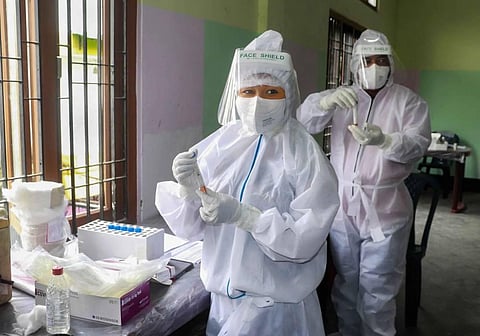

CHENNAI: One-fifth of the Chennai's population has been exposed to SARS-CoV-2, the virus that causes Covid 19, according to the preliminary findings of the population-based sero survey in the
Chennai Corporation limits.
Of the 12,405 individuals, across 51 wards, tested for antibody against SARS-CoV-2, 2,673 people had evidence of exposure with a seroprevalence of 21.5%.
Of the 12,405 persons, only 173 had a history of contact with a Covid 19 patient.
The survey was carried out by the National Institute of Epidemiology and the field data collection for this took place between July 18-28. The test positivity rate at the end of July was around 10%.
Seroprevalence is the percentage of individuals of the population to have antibodies against SARS-Cov-2.
"Around 80% of the population is still susceptible to SARS-CoV-2 ingestion in Chennai," the sero survey report, released by the Chennai Corporation on Tuesday, stated.
However, it was found that seroprevalence varied vastly across various zones of Chennai Corporation.
For instance, 44.2% of the samples tested for the survey in Tondiarpet zone were found positive for IgG antibodies against SARS-Cov-2, which means that they have had previous exposure to the virus.
On the other hand, only 7.1% of those tested for the antibodies in the Madhavaram zone were found to have them.
Royapuram, another high-incidence zone, also recorded high seroprevalence of 34.4%. The Perungudi zone was found to have low seroprevalence of 7.3%.
"We need to understand the reasons for varying seroprevalence across zones to improve our control measures," the survey stated.
The ward-wise break up showed that Korukkpet (Ward 47), had 50% seroprevalence. New Washermanpet (Ward 39) had 49% seroprevalence while Mugalivakam (Ward 156) and Lakshmipuram (Ward 32) had the lowest seroprevalence of 2% and 3% respectively.
Meanwhile, out of the overall seroprevalence, women were found to have a higher percentage of seroprevalence (23.7%) when compared to men (19.3%). Across age groups, those between the ages of 10 and 19 had higher seroprevalence of 23.8% whereas those above the age of 60 had the lowest (15.9%).
The results also showed that the Infection to Case ratio (the number of cases of a disease compared to the number of infections with the agent that causes the disease) for the period of 14 July was 22.4%.
This, the survey said, was lower compared to some published studies, indicating high testing.
Apart from this, around 1.35 lakh people in Chennai have been tested positive for Covid 19 out of which 1.19 lakh have recovered as on Tuesday.
Addressing reporters, Chennai Corporation Commissioner G Prakash said that such seroprevalence surveys will continue.
"Wherever seroprevalence is high, reflection of (Covid 19) cases is lower. We can see that they are now stabilising in these areas- this is a natural outcome, the transmission speed will come down where
seroprevalence is high," he said.
"This was done 35 days ago, the seroprevalence will be higher now. It is important to know this because it is only then we will be able to balance interventions. We can increase interventions where seroprevalence is low," he added.